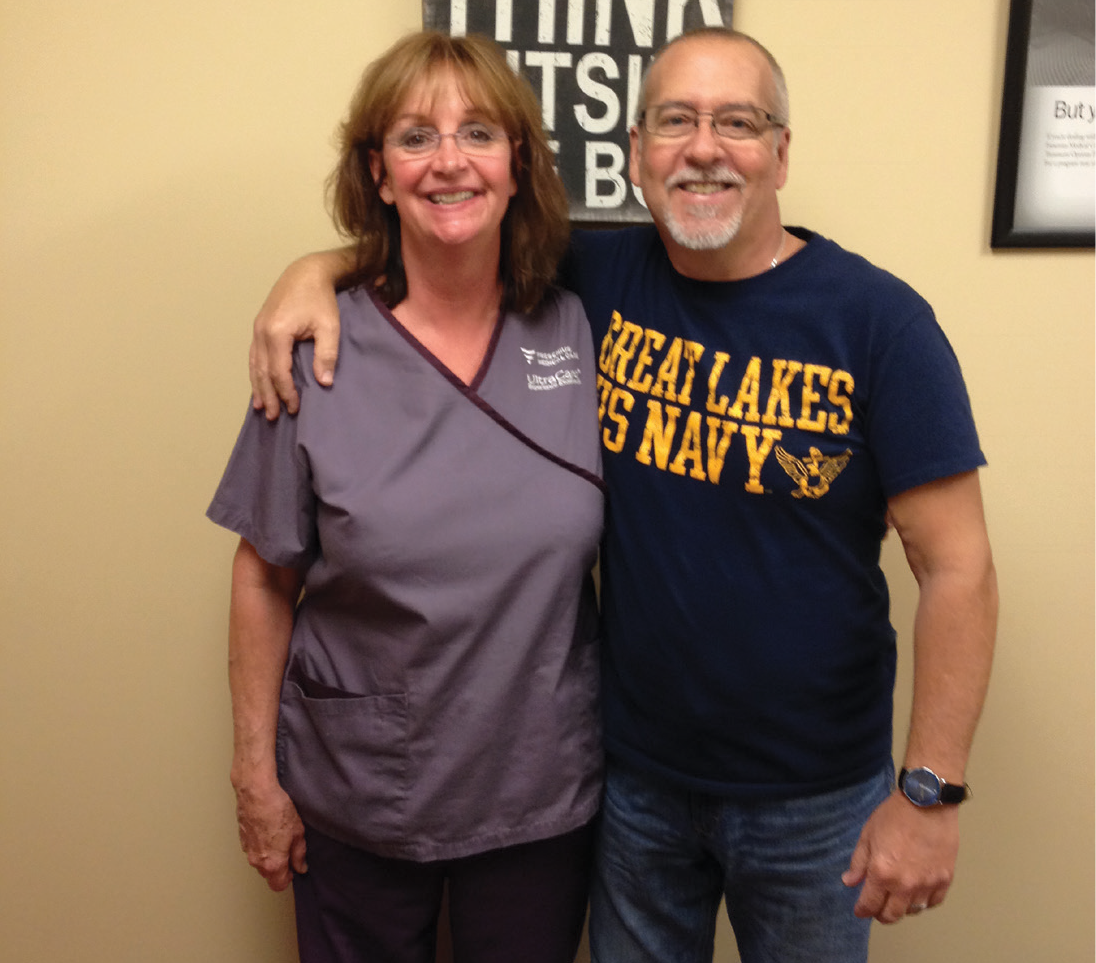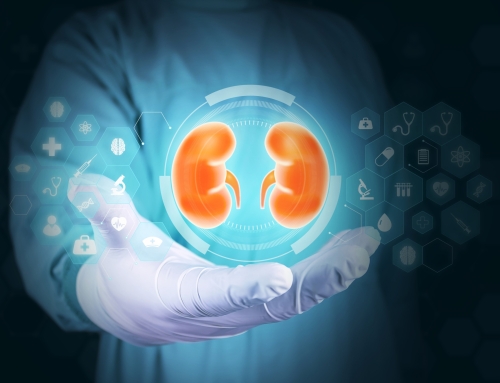By Joanne Smith
On August 11, 2015, I had the wonderful opportunity to provide a fellow human being with a kidney.
Growing-up my grandfather told me “giving is a wonderful thing and it makes you feel real good.” He made me realize that when someone is giving something to you, they have the same opportunity to feel “real good.” I learned to be a generous giver, but more importantly to be a gracious receiver. This actually enables others to enjoy the feeling of being generous givers as well. So, please don’t be afraid to ask your friends and family members to become kidney donors for you.
I began my journey to kidney donation several years ago, when a family tragedy led me to the nursing profession. It actually led me back to school at the age of 32, where I attended college to earn my RN degree. Shortly, thereafter I began to work for a privately owned dialysis facility serving in-center dialysis patients.
After one year, the attending nephrologists bought their own facility and I left to be their Director of Nursing. I loved that in dialysis you could provide quality continuity of care, because the patients came three times each week. My patients quickly became like family members.
Within the next year, our clinic was bought by one of the big dialysis companies. I worked acute dialysis, dialysis cruises and incenter dialysis for another 12 years.
Then the opportunity was presented to me to learn about home dialysis. Initially, I thought that it may be too difficult for anyone to do home dialysis. I was wrong. Home dialysis gives patients the opportunity to receive treatment five to seven times a week which is how the body is programmed to have toxins and excess fluid removed and all other chemistries balanced. Since then, I have been overseeing several home dialysis clinics with over 150 patients performing their treatments at home, staying healthier and happier and in control of their lives.
As a dialysis nurse, I also teach options classes about kidney disease. These classes inform CKD patients about the common causes, the progression of kidney disease and what options are available. That donors we can live without the need for renal replacement therapy with only 25% of one kidney functioning. And, as a chronic kidney disease educator I encourage families and friends who attend the Treatment Options programs to consider donating a kidney, “after all, that’s why God gave us two.”
Over the years, I have talked to countless family members and friends about donating a kidney, but I never felt it was the right time for me. I felt comfortable in the knowledge that before a donation, every possible type of testing is performed including psychological to make certain that once that kidney was donated, the donor’s chances of having kidney failure would be minimal. In fact, the statistics state that donors actually have less chance of having kidney failure than the general population. This has to do with the fact that a donor must be in good health in order to donate a kidney.
My initial interview with the transplant team happened in early May. I had been to my church the day before for services and God put the name of one of my patients in my mind and I wondered why I didn’t think of him myself. It seemed like the perfect time to be able to donate.
My staff are a team of wonderful nurses, patient care techs, secretaries, social workers and dietitians that have the same values as me. They work together and independently to achieve quality goals for all of our patients. I had great faith in them that they would continue in my absence. I had plenty of vacation and sick leave built up, and family members available to assist me when I was discharged after surgery. I also had a discussion with my supervisor and medical director who were very supportive of my decision.
During May, June, and July, I had every imaginable type of testing from blood work for infectious diseases to stress tests, EKG, echocardiograms, and renal scans, you name it.
I met with the surgeon, nephrologist, social worker, dietitian, donor advocate and pharmacist for the transplant team several times. Each time, test results were reviewed as well as the plan for surgery. Every discussion contained the fact that no matter how far into the testing I went, I always had the right to change my mind and the team would support that decision. I knew everything that could happen. My mind was set.
Finally, the surgery was scheduled. My family and friends met with the recipient and his wife at my house for a celebration two days before the surgery. We were welcoming them into our family.
I had known my recipient for six years as he was a home hemodialysis patient. In his early 40’s he was diagnosed with cancer of the kidney and came to find out that he was only born with one kidney. That meant that after the cancerous kidney was removed, he would need dialysis immediately to sustain his life.
He started in-center dialysis and after he was educated on home dialysis, decided he would do peritoneal dialysis (PD). That is when we met.
PD went well for a while, but he had some complications such as hernias and infections and ended up having to change from PD to home hemodialysis.
He was always optimistic and upbeat when he came to the clinic for his monthly visit. Several of his family members were tested for donation, but for one reason or another were unable to donate. I did not want to let him know that I was being worked up to donate until I was sure things would work out.
Finally the transplant team suggested that I let him know that I was being worked-up to donate a kidney to him…
I was excited, but felt awkward when I went to his house on a Saturday morning. I knocked on the door and could hear his wife running the vacuum. I knocked again, no answer. I happened to have his number in my phone from being on call, so I called and he answered. He was surprised that it was me and said “I didn’t recognize the number and was hoping it was a call for a kidney.” He called down to his wife to open the door as he was on his dialysis machine at the time.
We had met several times in the past. She was very supportive of her husband’s disease and treatment and had accompanied him to the clinic for his monthly visits. I asked her to step outside for a minute and I told her I was getting worked up to donate a kidney to her husband. She looked shocked and then started to cry and hug me. She thanked me. I told her I had wanted to donate for years and that her husband’s name came to me during my prayers in church. I then asked her if she would let her husband know, but she insisted that I tell him.
We went upstairs and he was sitting beside his bed attached to the dialysis machine that was keeping him alive. He greeted me and again said that he didn’t recognize the number and thought it might be a call for a kidney and laughed.
I started in with, “well, it was a call for a kidney,” he looked puzzled and his wife said that I was there to tell him I was being worked-up to donate a kidney for him. He looked stunned. He started objecting saying, “what about you?” His wife interjected that I had wanted to donate a kidney for years and that I was donating to him or someone so he should definitely consider accepting. I excused myself saying I had to get back to my dogs.
I continued with my usual routine of working and scheduling tests around my work schedule. A week went by. My recipient called me and asked if we were still on? “Absolutely” was my reply. I knew in my heart that God brought me to this and He would bring me through this. My good friend and confidant, Nancy Scott told me this.
Every test result I received, I let him and his wife know the results (the transplant team cannot give the recipient any medical information about the donor nor the donor any medical information about the recipient due to HIPAA regulations).
Finally, all the testing was complete for both donor and recipient and the date was set for surgery. I informed my supervisor that I would be out of work for four to six weeks after surgery. I also informed my supervisor at Dialysis Patient Citizens (DPC) that I might be unavailable for a few weeks due to donation. Of course, my DPC team members were very supportive and proud.
The day before surgery I had a pre-op EKG, took a bowel – prep similar to what is used before a colonoscopy, had some lab work and met with the transplant team again. Once again, I was asked if I was certain of my decision to move ahead and informed me that I could cancel right up to the first incision. I had no doubts. I kept waiting to get nervous. The doctor even told me that I could have an anti-anxiety pill the morning of surgery if I wanted. I guess God was my anti-anxiety medication. I knew everything would go as expected and it did.
After the surgery, I had a pain pump that I could use as needed, which I did use for the first three days. The surgeon implanted a lidocaine pump on my incision site and I had NO PAIN at the incision, but I had some deeper tissue pain which the pain pump helped with. Really, just a feeling of not being able to get comfortable.
I had an open cut incision versus a laparoscopic surgery. This was my decision. I felt that an open cut with a partial rib removal would be quicker and allow the surgeon easier access to my left kidney.
Second day post-surgery, I was out of bed. Slowly at first, but eventually up sitting in a chair, showering, and on the mend. I was discharged on the fourth day after surgery.
My recipient’s creatinine level also plunged back to normal as a result of a living donor transplant. Maintaining this level will allow my recipient to remain off renal replacement therapy and hopefully allow him to live another 20 or more years. Time to meet his unborn grandchildren, time to spend with his wonderful wife and family, who were all so supportive during his time on dialysis. Time for him to make a difference in the lives of many people, especially those diagnosed with ESRD. He has vowed to continue to help educate people about dialysis and now transplant.
My labs were abnormal for the first couple of days, but by my tenth day post op, my labs were back to normal (my creatinine is 1.1 which is a little higher than normal), but I only have one kidney now. I have a list of medications that I need to avoid to protect my one functioning kidney. I have attached that list as well. I will follow-up with the transplant team one month from my surgery date and then periodically to make sure I am doing all I can to live a healthy life and protect my one kidney.
This has been a wonderful, blessed journey for me. I feel that the gift I was able to give filled my heart and soul. My recipient has expressed his appreciation over and over, which is a little uncomfortable for me. I love giving, but receiving has never been a talent that I’ve mastered. I am getting better at it.




